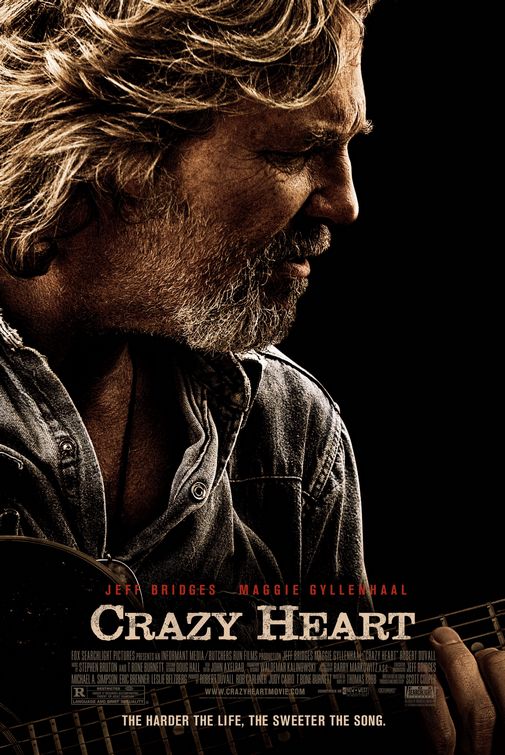Status: In limited release (opened 12/16/09)
Directed By: Scott Cooper
Written By: Scott Cooper
Cinematographer: Barry Markowitz
Starring: Jeff Bridges, Maggie Gyllenhaal
There are some stories that’re good enough to be told many times without getting old. Crazy Heart falls into this category; its story is nothing particularly novel, but it’s told well enough that we don’t mind knowing where it’s going, and more importantly, following along on its well-known path is nonetheless an enjoyable experience. Adapted from Thomas Cobb’s book of the same name by writer-director Scott Cooper, Crazy Heart tells the story of Bad Blake (Jeff Bridges), a down-and-out, has-been country singer. He plays shitty little gigs, which he has to drive himself to in his ’78 Suburban (named, it should come as no surprise, Bessie). He has a drinking problem. He’s lonely. He has an antagonistic relationship with his manager (Paul Herman).
When Bad meets a beautiful music reporter who’s half his age (Maggie Gyllenhaal), he’s instantly smitten with her. She inspires him to try to improve his life. But oh, just when it’s looking like their unlikely coupling will pan out after all, he hits the proverbial rock bottom and screws up his chances with her (or does he?), and has his real awakening. His story becomes one of redemption, of finding one’s place in life after having already given up on it, of finding a purpose that had previously been lost. Sound familiar? Sure it does, but it’s a compelling story and it’s told well. We know the road Bad is headed down all too well, but we still want to see him travel it.
The primary reason for this, of course, is Jeff Bridges. He’s the kind of actor I can’t imagine anybody not loving—he was The Dude, after all. Bad Blake is quite a different character from the iconic Lebowski, but Bridges’ embodiment of him is just as defining. He not only gets to show off his acting abilities, he gets to sing, too—and can he. (You can sample this and his many other talents at his whimsical website, jeffbridges.com.) Bridges hangs it all out as Bad, and his performance, his depiction of this fully-realized character, is the movie’s main draw.
The supporting cast is equally up to the task of filling out the rest of the requisite parts. Maggie Gyllenhaal plays the typical Maggie Gyllenhaal role, and she does so in her typically endearing and strong Maggie Gyllenhaal fashion. Robert Duvall, too, shows up in a role that he seems like he’s been playing a lot in recent years, but his character adds a needed dimension to the story at just the right time, and he too is typically charming. Most impressive, though, is Colin Farrell as Bad’s former protege who has now far surpassed him in popularity and success. The Irishman plays a believable Texan, a character stuck trying to reconcile his aspirations with his loyalty. There are but a few scenes between Bridges and Farrell, but they’re all pivotal ones, and they flesh out the storyline as much as do Bridges’ key scenes with Gyllenhaal. Farrell, too, gets to show off some surprisingly serviceable country-singing chops.
Scott Cooper has generally good instincts for a first-time director. He knows enough to make Bridges’ musical performances a centerpiece of his film, but he also knows not to linger too long on them. We get a sense of how Bad performs at various stages throughout the movie, and we feel like we know what it’s like to be in his audience, but we don’t become restless in our desire for the story to keep moving. It’s mostly slowly-paced, but this fits with the overall mood, which Barry Markowitz’s cinematography complements well: it utilizes the Southwestern vistas to effectively establish Bad’s lonely place in the world, while at the same time showing how that same desolation can appear beautiful once your outlook on life has changed. The overall structure of the movie, though, feels a bit awkward, mainly due to a somewhat protracted third act. It almost seems like Cooper runs out of patience after painstakingly setting up Crazy Heart‘s resolution, and then rushes his way through it when it finally comes.
This is okay, though, because as I said, the story here is one we feel like we know already, and we only need a nudge to assume in which of two possible ways it’s going to play out. What gives Crazy Heart its identity, though, is its great acting performances, which are only overshadowed by its great music, by Stephen Bruton and T-Bone Burnett. They’re the kind of songs that seem like old standards, even though they were written specifically for the film. When the great acting and the great music are combined—particularly when we get to see Jeff Bridges croon out some of these songs—it’s a film that’s hard not to get into; you can’t help but want to allow it to take you down its road.




